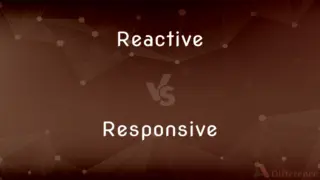Rebounce vs. Rebound — What's the Difference?
By Tayyaba Rehman — Updated on August 21, 2023
Rebounce is rarely used in modern English and typically means to bounce back, while rebound is a common term meaning to recover after a setback or to bounce back.

Difference Between Rebounce and Rebound
Table of Contents
ADVERTISEMENT
Key Differences
Rebounce, while less common, can mean to bounce back or to reflect. On the other hand, rebound signifies a return to a previous state or condition, especially after a setback, and is also used to describe the action of bouncing back, such as a ball off a wall.
When discussing sports like basketball, the term rebound is frequently used. It refers to the act of retrieving the ball after a missed field goal or free throw attempt. Rebounce, in such contexts, would be out of place and might not be readily understood.
In the broader context of life events and situations, when someone says they are "on the rebound", they are often referring to recovery or trying to move on after a relationship or setback. The term rebounce would rarely, if ever, be used in such a context.
In terms of etymology, both words originate from the idea of bouncing back. However, rebound has its roots in Old French "rebondir", and through usage and time, it has become the preferred term in English. Rebounce, while understandable, simply hasn’t enjoyed the same frequency of use or widespread recognition.
Comparison Chart
Usage Frequency
Rarely used in modern English.
Commonly used in various contexts.
ADVERTISEMENT
Contextual Meaning
Typically just bouncing back or reflecting.
Can refer to recovering or bouncing back.
Associated Action
Primarily just the act of bouncing.
Can be an emotional or physical bounce-back.
Etymology
Derived from "re-" prefix and "bounce".
Originates from Old French "rebondir".
Context in Sports
Rarely used, if at all.
Common term, especially in basketball.
Compare with Definitions
Rebounce
To reflect or echo back.
The sound seemed to rebounce off the distant hills.
Rebound
To bounce back after hitting a surface.
The basketball rebounded off the backboard.
Rebounce
To return to an original position by bouncing.
The toy seemed to rebounce each time it was pressed.
Rebound
To recover in value, amount, or strength after a decrease.
The stock market rebounded after a week of losses.
Rebounce
To bounce back; to bounce anew.
Rebound
In basketball, to retrieve the ball after a missed shot.
He's one of the best players to rebound in the league.
Rebounce
An alternate term for rebound, though less commonly used.
The basketball will rebounce off the rim if it doesn't go through.
Rebound
To return to a previous condition, especially after a setback.
After the breakup, she quickly rebounded and found happiness.
Rebounce
To bounce back after hitting a surface.
The ball will rebounce if thrown against the wall.
Rebound
(Basketball) To retrieve and gain possession of the ball as it bounces off the backboard or rim after an unsuccessful shot.
Rebounce
Rebounce (Danish: Frit fald) is a 2011 Danish drama film written and directed by Heidi Maria Faisst. The film won a Robert Award for Best Children's Film at the 2012 Robert Awards.
Rebound
(Sports) A rebounding or caroming ball or hockey puck, especially coming off of a goalie who has blocked a shot.
Rebounce
To spring or jump back.
The spring-loaded mechanism will rebounce when released.
Rebound
(colloquial) The period of getting over a recently ended romantic relationship.
Rebound
Bounce back through the air after hitting something hard
His shot hammered into the post and rebounded across the goal
Rebound
Recover in value, amount, or strength after a decrease or decline
The Share Index rebounded to show a twenty-point gain
Rebound
(of an event or action) have an unexpected adverse consequence for (someone, especially the person responsible for it)
Nicholas's tricks are rebounding on him
Rebound
(in sporting contexts) a ball or shot that bounces back after striking a hard surface
He blasted the rebound into the net
Rebound
An increase in value, amount, or strength after a previous decline
They revealed a big rebound in profits for last year
Rebound
To spring or bounce back after hitting or colliding with something.
Rebound
To recover, as from depression or disappointment.
Rebound
To reecho; resound.
Rebound
To cause to rebound.
Rebound
(Basketball) To gain possession of (the ball) off the backboard or rim.
Rebound
Past tense and past participle of rebind.
Rebound
To bind again, especially to put a new binding on (a book).
Rebound
A springing or bounding back; a recoil.
Rebound
(Basketball) The act or an instance of taking possession of a rebounding ball.
Rebound
A quick recovery from or reaction to disappointment or depression
He is on the rebound following a tumultuous breakup.
Rebound
A book that has been rebound.
Rebound
The recoil of an object bouncing off another.
Rebound
An effort to recover from a setback.
Rebound
(colloquial) A romantic partner with whom one begins a relationship (or the relationship one begins) for the sake of getting over a previous, recently ended romantic relationship.
Rebound
(sports) The strike of the ball after it has bounced off a defending player or the crossbar or goalpost.
Rebound
(basketball) An instance of catching the ball after it has hit the rim or backboard without a basket being scored, generally credited to a particular player.
Rebound
To bound or spring back from a force.
Rebound
To give back an echo.
Rebound
(figuratively) To jump up or get back up again.
Rebound
(transitive) To send back; to reverberate.
Rebound
Simple past tense and past participle of rebind
Rebound
To give back an echo.
Rebound
To recover, as from sickness, psychological shock, or disappointment.
Rebound
To send back; to reverberate.
Silenus sung; the vales his voice rebound.
Rebound
The act of rebounding; resilience.
Flew . . . back, as from a rock, with swift rebound.
Rebound
Recovery, as from sickness, psychological shock, or disappointment.
Rebound
A movement back from an impact
Rebound
A reaction to a crisis or setback or frustration;
He is still on the rebound from his wife's death
Rebound
The act of securing possession of the rebounding basketball after a missed shot
Rebound
Spring back; spring away from an impact;
The rubber ball bounced
These particles do not resile but they unite after they collide
Rebound
Return to a former condition;
The jilted lover soon rallied and found new friends
The stock market rallied
Rebound
To respond to a setback or challenge with renewed energy or vigor.
After failing the first test, he rebounded with extra study and aced the next one.
Rebound
A return to health or well-being; a recovery.
I am on the rebound.
Rebound
To spring back; to start back; to be sent back or reverberated by elastic force on collision with another body; as, a rebounding echo.
Bodies which are absolutely hard, or so soft as to be void of elasticity, will not rebound from one another.
Rebound
To bound again or repeatedly, as a horse.
Common Curiosities
Is rebounce a commonly used term?
Rebounce is infrequently used in modern English, while rebound is much more common.
What does it mean to be "on the rebound"?
Being "on the rebound" often refers to someone recovering or trying to move on after a relationship or significant setback. The term "on the rebounce" isn't used in this context.
Can rebounce mean to echo or reflect?
Yes, rebounce can mean to echo back or reflect, though it's a less common usage.
Which word should I use if I'm referring to a ball bouncing off a wall?
Either could technically work, but "rebound" is the more common and recognized term.
Are there any idiomatic expressions using rebound?
Yes, phrases like "on the rebound" or "make a rebound" are idiomatic expressions. There aren't commonly recognized idioms using rebounce.
Can I use rebounce and rebound interchangeably?
While both imply a sense of returning or bouncing back, rebound is the preferred and more recognized term in most contexts.
In which scenarios would rebounce be the better choice?
Rebounce is rarely the preferred choice in modern English, but might be selected for poetic or stylistic reasons.
Are both terms derived from the idea of bouncing back?
Yes, both rebounce and rebound originate from the idea of bouncing back, though rebound has a richer etymological history.
Is rebounce used in sports?
Rebound is the recognized term in sports, especially in basketball, to describe retrieving the ball. Rebounce would be out of place.
Are there emotional connotations associated with these words?
Rebound can have emotional connotations, especially in reference to relationships or recovery. Rebounce lacks these associated meanings.
Share Your Discovery

Previous Comparison
Reactive vs. Responsive
Next Comparison
Valuable vs. WorthyAuthor Spotlight
Written by
Tayyaba RehmanTayyaba Rehman is a distinguished writer, currently serving as a primary contributor to askdifference.com. As a researcher in semantics and etymology, Tayyaba's passion for the complexity of languages and their distinctions has found a perfect home on the platform. Tayyaba delves into the intricacies of language, distinguishing between commonly confused words and phrases, thereby providing clarity for readers worldwide.












































